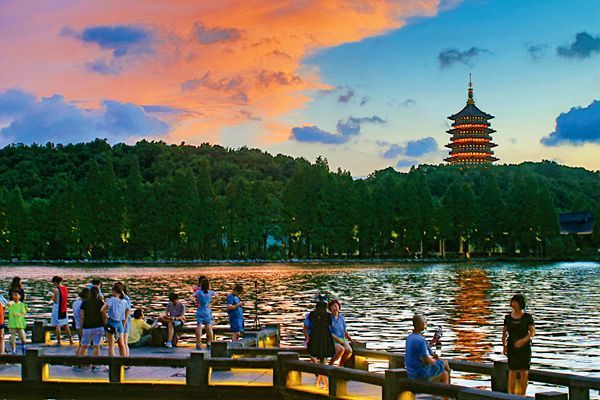Hangzhou: ancient yet modern city
- By Jiang Wandi
 0 Comment(s)
0 Comment(s) Print
Print E-mail Chinatoday, September 20, 2016
E-mail Chinatoday, September 20, 2016
Summer in Hangzhou, the capital of East China's Zhejiang Province, is exceptionally hot and humid, owing to its geographical location and many lakes and crisscrossing rivers. The city feels even hotter this year due to the comprehensive preparations for the G20 Summit held in early September. Roads were built, causing dust to swirl through some communities. Public facilities and tourist sights were also renovated and repainted, and security was inevitably tightened.
Following the 2015 G20 Summit in Antalya, a Turkish city on the Mediterranean coast, China was chosen to host this year's summit in accordance with the rotation system. China has experience in organizing large-scale international events, including two APEC economic leaders meetings, the 2008 Summer Olympic Games, and the 2010 World Expo. But why was Hangzhou chosen instead of the more cosmopolitan Beijing or Shanghai? Upon asking a random selection of locals, some attributed it to Hangzhou's strong economic performance, good infrastructure, and abundant cultural resources. But a clear consensus emerged that the city's natural beauty is its ultimate charm.
Landscape of Nature and Culture
Traveling around China's different cities and countryside, you may find that Hangzhou is the best place to meet photographers, professional or amateur, busy snapping almost everything they encounter. A city of hills and lakes, this unique topographic feature endows Hangzhou with a picturesque landscape. Apart from various tourist options, many wetlands that lie near the city or in adjacent areas are ideal sites for a short escape from the hustle and bustle of larger cities.
|
The West Lake lakeside view suffused in a sunset glow. |
Lovers of green tea will find Hangzhou particularly rewarding. West Lake Longjing is the No.1 brand of green tea in China, well known for its delicate fragrance and crystal green color. Thanks to its natural climate, Hangzhou boasts a number of tea-planting areas, the most famous of which used to send tea directly to the royal rulers of ancient China. These places are now tourist spots, where visitors may taste and purchase tea, and even pick tea leaves in the harvest season. Since West Lake Longjing is grown in a limited quantity every year and the demand is huge, prices are sky-high.
Hangzhou is a suitable place to learn more about Chinese history. The city was built over 2,200 years ago and was one of the seven ancient capitals of China, leaving behind a vast legacy of cultural heritage, both tangible and intangible. Over 100 museums sprawl across the city, including the large Zhejiang Provincial Museum and Hangzhou Museum. There are also numerous themed museums in small neighborhoods, discreetly tucked away from mainstream tourists. These gems can be unearthed by the more earnest travelers.







Go to Forum >>0 Comment(s)